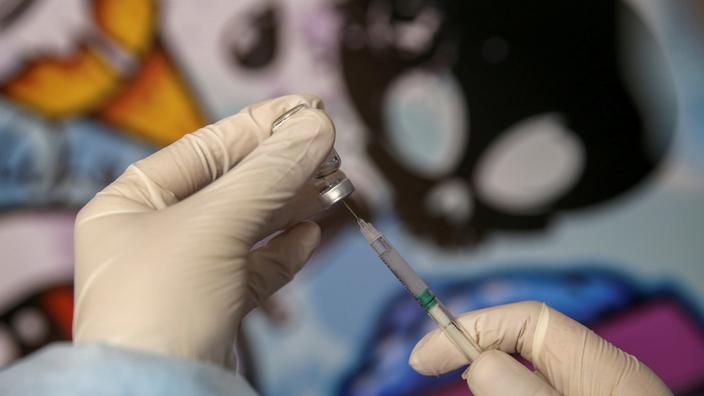Vaccinated, delivered!
After more than a year of restrictions, the vaccination is expected by many to be a true liberation.
“
Goodbye Covid!
Is heard in people who have recently received their injections.
However, positive cases continue to be detected among vaccinated people, as in this nursing home in Biscarosse, in the Landes, where 23 people contracted the virus a few days after their injection.
What does the vaccine guarantee?
Does it allow immunity?
Should we continue to practice barrier gestures?
Le
Figaro
answers all your questions.
To discover
Covid-19: instructions for use of self-tests
I received only one dose of vaccine, am I already protected?
The first dose of vaccines already partially protects against the virus. For Pfizer and Moderna vaccines, immunity is 90% as early as three weeks after the first injection. For its part, AstraZeneca provides, 22 days after administration of the first dose, 76% protection, which is maintained for at least 90 days. Likewise, a first dose of these vaccines makes it possible to reduce the transmission of the coronavirus by nearly 50% within the same household according to a study by the English public health agency (PHE).
However, with the exception of the Johnson & Johnson vaccine, the Pfizer, Moderna and AtsraZeneca vaccines require a second injection for full effectiveness.
“
The second dose is there to strengthen immunity, and make it last over time.
Without it, the effect of the vaccine will gradually disappear
, ”explains Clotilde Latarche, doctor at the Nancy University Hospital.
According to ARS Île-de-France,
it is necessary to wait ten days after the second dose
for the vaccine to reach its maximum effectiveness.
To read also: Vaccination: these thousands of niches which do not find a taker in France
I received my two doses of vaccine, am I immune?
“
Vaccination is not liberation!
», Alert the doctors.
Indeed, the effectiveness of vaccines is measured on the risk of severe form as well as deaths from Covid-19.
“
But
it is still possible to contract the disease in milder forms
, such as a mild flu,
” recalls Dr. Latarche.
"
The vaccine avoids going to intensive care, but it does not get rid of the virus
."
Thus, two studies published at the end of March in the
New England Journal of Medicine
showed a 95% effectiveness of Moderna and Pfizer vaccines, indicating that infections after vaccination, although very rare, were a real risk.
Once vaccinated, should I continue to practice barrier gestures?
While the vaccine limits the development of the disease, it does not completely prevent the virus from entering the body. In other words,
you can still
be the vector of the virus and infect a third party
. So a vaccine that is 95% effective means, according to Johns Hopkins University, that about 1 in 20 people may not be protected against the disease.
It is in this context that the High Council of Public Health (HCSP) published its post-vaccination recommendations, recalling in particular "
the importance of barrier measures, even when being vaccinated
", until collective immunity is achieved.
"
For us to regain life before, it would probably be necessary for vaccination coverage in France, all people combined, all age groups combined, to be at least 80%
", explained Bruno Lina, member of the Board. scientist and virologist at the Croix-Rousse hospital in Lyon, at the beginning of April on TF1.
Read also: Covid-19: will France and Europe be able to achieve “collective immunity” on July 14?
In addition, the efficacy of vaccines currently on the market is measured on the historical form of Sars-Cov2, as well as on the English variant.
On the other hand, there are too few data on the Brazilian, Indian or even South African variants to guarantee their protection by the various vaccines.
The health authorities therefore urge the greatest vigilance.
If I visit my grandparents, do I have to keep my mask?
If your grandparents have been vaccinated and you are too, considering that you are less a vector and that they are, for their part, very well protected, the probability of transmitting the disease to them is very low.
With a complete vaccination schedule on both sides, you can choose to leave the mask aside, while keeping the barrier gestures: hand hygiene, inter-individual distance, ventilation and limitation of gatherings to 6 people.
As a vaccine recipient, what are my new rights?
In France, the vaccination certificate will take the form of a QR code on the TousAntiCovid application, a device that will be available in the coming days according to the Ministry of Health. However, the government has yet to decide on the benefits that could be reserved for the vaccinated, including access to restaurants, gyms or public gatherings. The French are also rather hostile to the idea of a vaccination passport. Last March, a vast consultation launched by the Economic, Social and Environmental Council showed that 7 out of 10 French people were "very unfavorable".
At European level, however, it will be introduced from June 15, to facilitate travel between countries. It will therefore be necessary to be vaccinated to take the plane, participate in a large-scale event or access certain public places within the European Union. For their part, some countries such as Sweden, Iceland or Denmark have introduced the compulsory vaccination passport on their territory.






